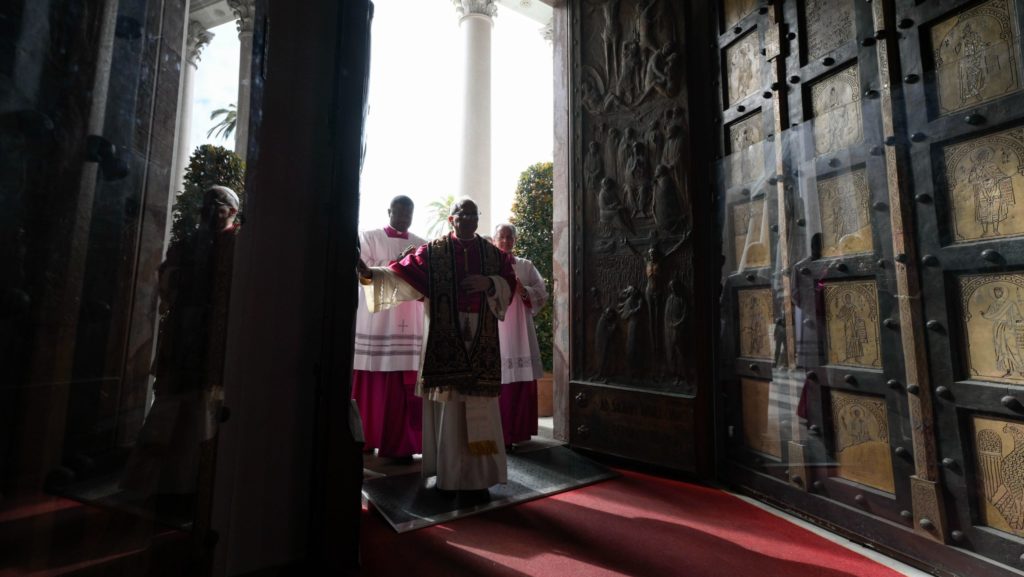As some of you perhaps know, I was in Rome earlier this month, providing commentary for various news networks who were covering the papal conclave. It was a fascinating, exhausting, and exhilarating seven days! And it culminated, to everyone’s astonishment, with the election of a pope from America, indeed from my own hometown of Chicago.
Because I was moving from network to network, I spent a lot of time driving around Rome, going from pillar to post. In the process, I passed many of the monuments of the ancient empire. I drove past the Largo Argentina, where Julius Caesar was assassinated in 44 BC. I spied the Circus Maximus, where games and chariot races were regularly held when Rome was at the height of its influence. Just above the Circus Maximus, perched on the Palatine Hill, I saw the remains of the palace of the emperor. And just to the east of the Palatine I saw, stretched out before me, the Roman Forum from which the sprawling empire of the Caesars was once governed. Often, during my travels through the city, I observed, at the far end of the forum, the great Colosseum, where the gladiatorial games were held, and which provided the model for practically every stadium in the Western world. It is simply impossible to take all of this in and not marvel at the grandeur that was the Roman Empire.
Around the year 60, when Rome dominated the entire Mediterranean and when its armies struck terror in the hearts of millions, a middle-aged fisherman from Capernaum in Galilee named Simon Bar-Jonah, made his way to the great city. This man had known Jesus of Nazareth, who had given him the nickname “Peter” or “Rocky.” And he came to Rome in order to tell the world that his friend, whom the Roman governor had brutally crucified, had risen from the dead. So disagreeable did the authorities find this message that, around the year 64, they rounded up Peter and brought him to the Circus of Nero, situated outside the city, to the west of the Tiber River. There they crucified him upside down, and when their brutal work was finished, they cut him down and dragged his body to a cemetery that was immediately adjacent on the Vatican Hill and buried him. Anyone watching that scene unfold would have confidently predicted that the poor man would be forgotten forever and that the movement he advocated would soon enough be eliminated by the mighty Roman juggernaut.
But where is the Roman Empire? Answer: Nowhere, crumbled to dust. Where is the successor of Nero? Answer: He doesn’t exist. And what of the Forum, the Colosseum, the Circus Maximus, and the imperial palace on the Palatine Hill? Answer: All in ruins. But where is the empire of the Galilean fisherman buried on the Vatican Hill? Everywhere in the world, east to west, north to south. And where is the successor of Peter? Well, I saw him with my own eyes walk out onto the front loggia of the massive basilica that marks the burial place of Peter. His name is Leo XIV, and he is the 266th successor in an unbroken line of Simon Bar-Jonah. Simon’s friend from Nazareth, just after he gave Peter his distinctive nickname, said, “You are the rock on which I will build my church, and the gates of hell shall not prevail against it.” The enemies of Rome prevailed against it many centuries ago, but it is simply an empirically verifiable fact that the enemies of the Church, despite their very best efforts, have not managed to bring it down.
At the beginning of the fifth century, Augustine, the bishop of the North African city of Hippo, wrote a treatise called The City of God. The central argument of that lengthy and complex work is that the Roman order, based on violence and the lust to dominate, could not long endure and that the order of Christ’s kingdom, based on forgiveness, compassion, and nonviolence, would last until the return of the Lord. And following upon that observation, Augustine posed a simple but penetrating question to his readers: Of which city will you become a citizen? Which king will you follow? My recent sojourn in Rome, which brought to mind so vividly the kingdom of Caesar and the kingdom of Christ, compels me to comes to terms with those same questions.
Pope Leo XIV, ad multos annos!

